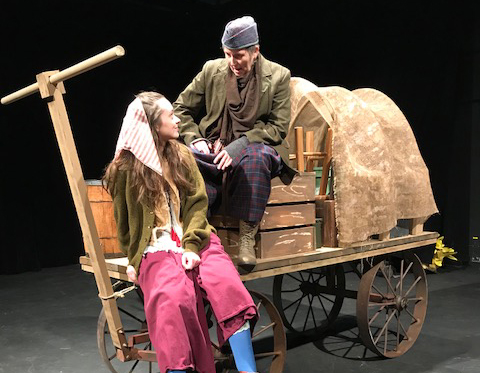TheatreUNI ‘Mother Courage and Her Children’

The TheatreUNI Production of “Mother Courage and Her Children” is an adaptation by Matthew Weeman of Bertolt Brecht’s play.
Nov 30, 2017
TheatreUNI will be presenting “Mother Courage and Her Daughters,” an adaptation of Bertolt Brecht’s “Mother Courage and Her Children” at Strayer-Wood Theatre on Wednesday, Nov. 29, through Saturday, Dec. 2, at 7:30 p.m. and Sunday, Dec. 3, at 2 p.m.
The production is an adaptation by Matthew Weedman, director of the play and an assistant professor in the theatre department, of the original play.
“The main character is Mother Courage, a woman who just follows the armies around and just sells things to people in the army,” Weedman said. “She doesn’t care about sides; all she cares about is making money, and she believes that she can sort of weather the storm and survive these wars intact by not having a side, and ultimately figures out that that’s not possible.”
The play will feature Cynthia Goatley, a professor of theatre who is retiring after this semester, as Mother Courage in her final performance with the department.
“Cynthia has been here for a really long time, and this is her chance to play this big role and kind of say goodbye to this community,” Weedman said.
“Mother Courage and her Children” is an anti-war play, written by Brecht after he fled Nazi Germany. The original play is set during the 30 Years War of the 17th century. Brecht was most interested in the intellectual response to theater than the emotional, and he structures his plays to invoke that kind of response. He was also interested in reminding his audience that they are watching a play, not allowing his audience to become too immersed.
“He didn’t want people to come and see a play and feel something[…] He wanted people to respond to it by thinking about what is happening,” Weedman said. “He was interested in what is called ‘distancing,’ sort of taking people away from an emotional occasion.”
The adaptation of the play by Weedman was written from a translation and is set in an undefined era. He said that as a cast, they looked through the Wikipedia page of how many wars there have been since the time that Bertolt set his play, and there were eight or nine pages listed.
“It’s the reality that in the past few hundred years, war has been more constant than peace,” Weedman said.
Weedman decided to change the play’s title to “Mother Courage and Her Daughters” for his adaptation because they wanted to explore the ways that war affects women specifically and the violence they may face as a result.
His adaptation features rawer dialogue and a more stripped down set. The production will feature lightning designed by Scott Olinger a guest lighting designer from Cornell College in Mount Vernon, Iowa.
The show will feature 16 cast members, and 10 of them are an ensemble that plays all of the other parts, such as soldiers and victims of the war. When they aren’t acting, those cast members remain on the stage watching the play. According to Weedman, this is part of Brecht’s idea that you should be reminded that you are watching a play.
“One of the things that I feel like we’re having a big conversation about nationally […] right now is: What do we do with refugees from wars? We live in a community that has a large population [of] Muslim refugees from a war in the 90s — the Bosnian-American population in Waterloo,” Weedman said. “One of our students actually interviewed a veteran of the Bosnian war, and we incorporated […] his experiences of what it was like to fight there into this production.”
Weedman said that even though it is an older play, it maintains its relevancy because it asks the questions: How does war affect us and why does it keep happening?
Callie Baack is a senior theatre performance major playing the role of one of Mother Courage’s daughters.
She said that this play has had the longest rehearsal period of any other play that the department has done during her time at UNI.
“These kids have been working on this since we cast the show in the second week of the semester,” Weedman said. “They’ve been working on it for 12 weeks almost. They’ve really poured themselves into it. They’ve been having a good time, and they’ve really taken ownership of it.”
“If you like movies, you will like the theater, so come!” Baack said. “It’s interesting for students to come and have the opportunity to see what their peers have been working on because often times theater is something that is really foreign to other people. You can sort of get a glimpse of how it all comes together when you see something live, and it’s easy for students to be cultured in this way.”








